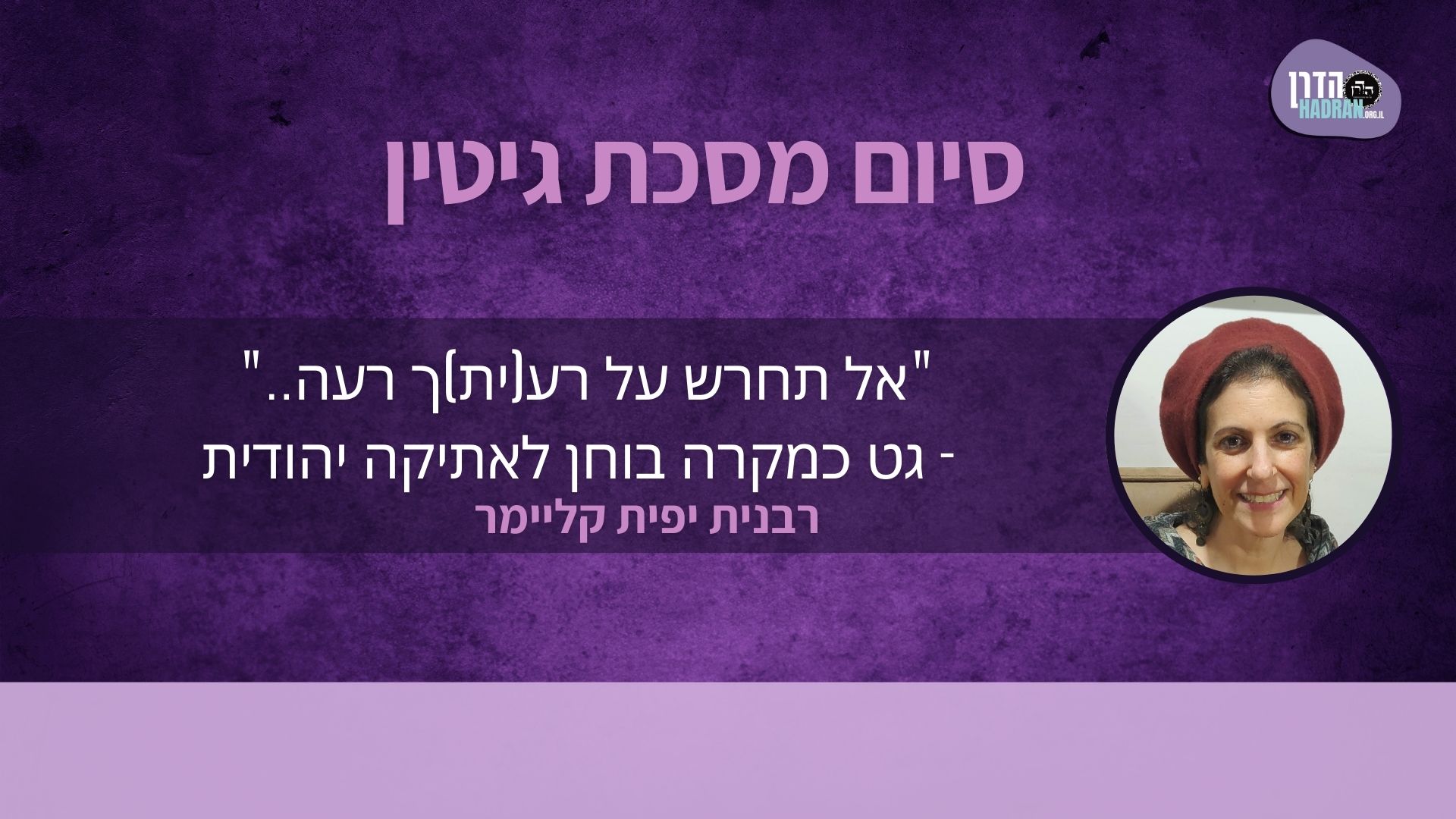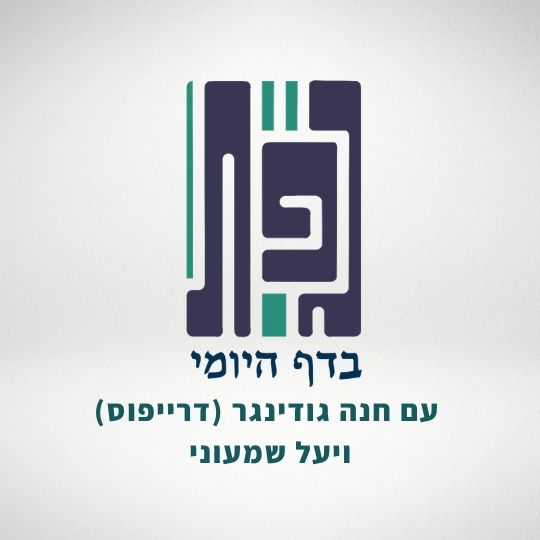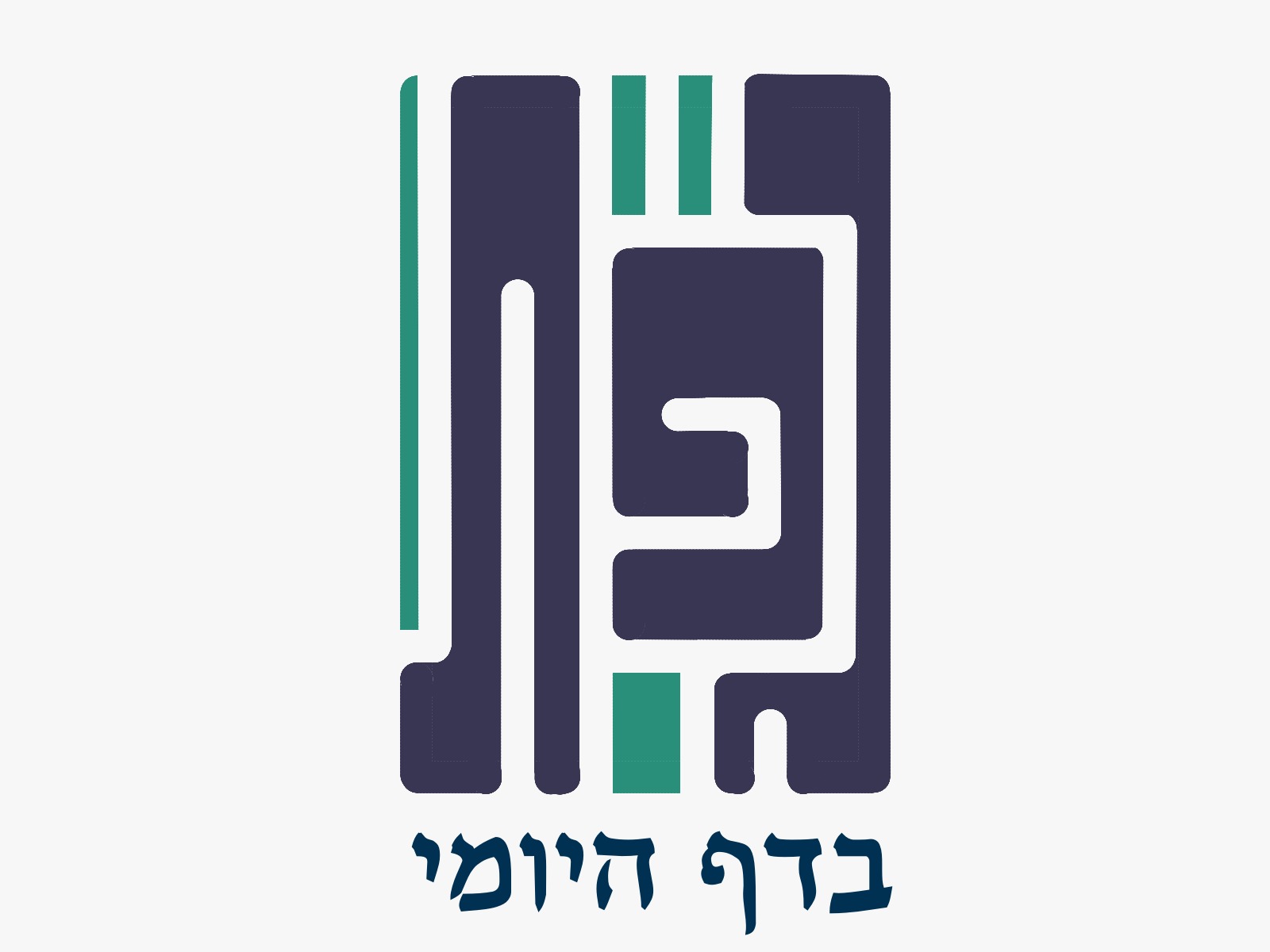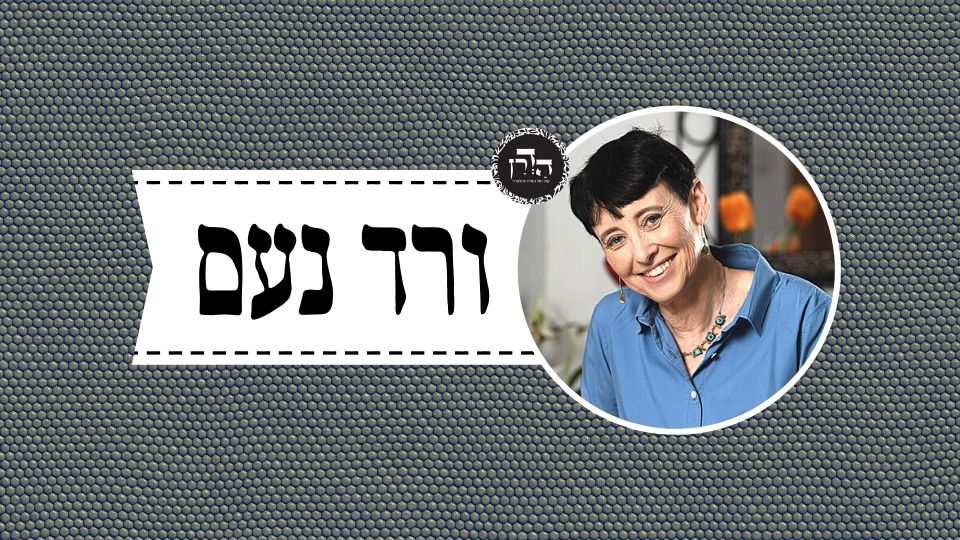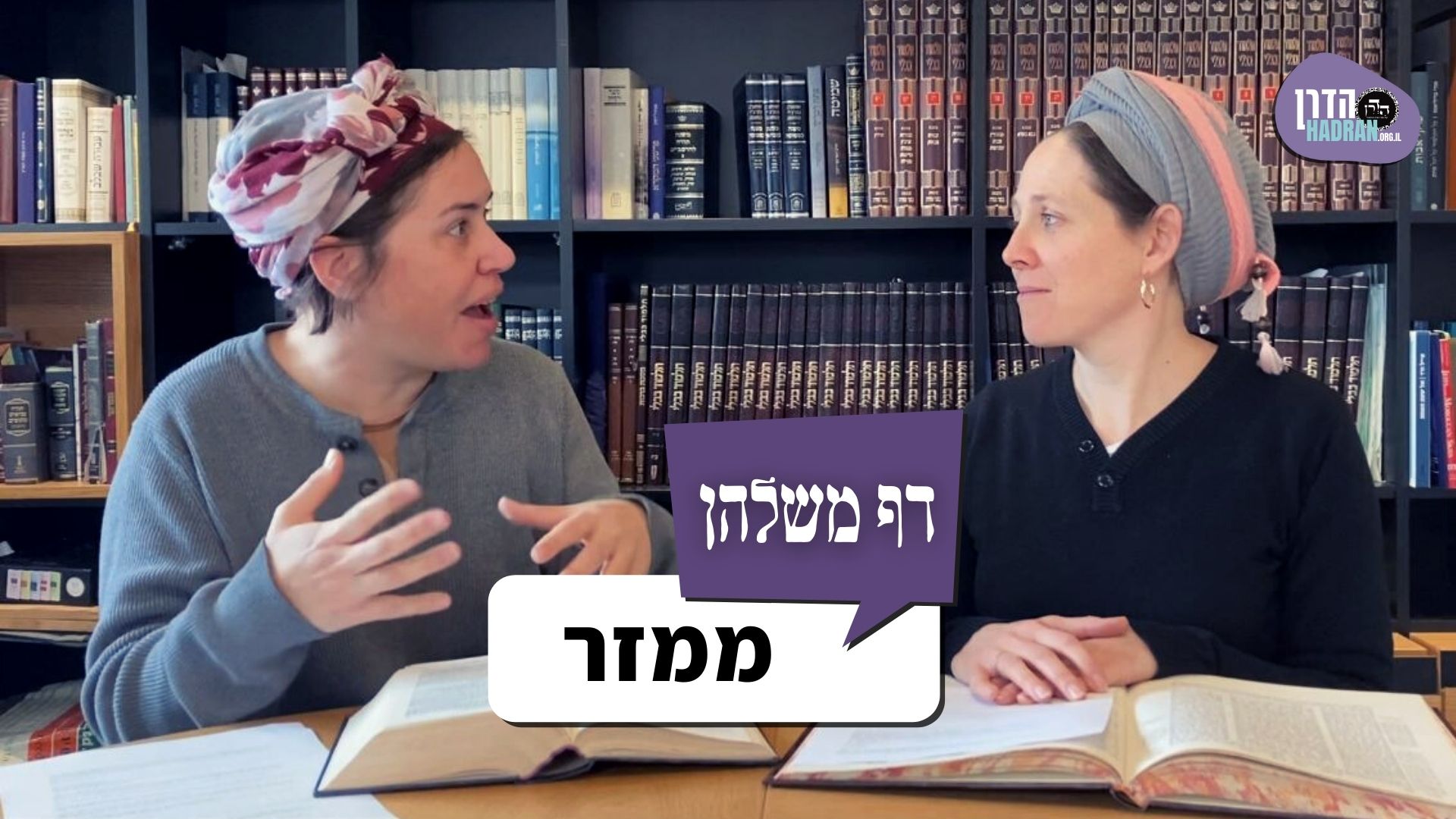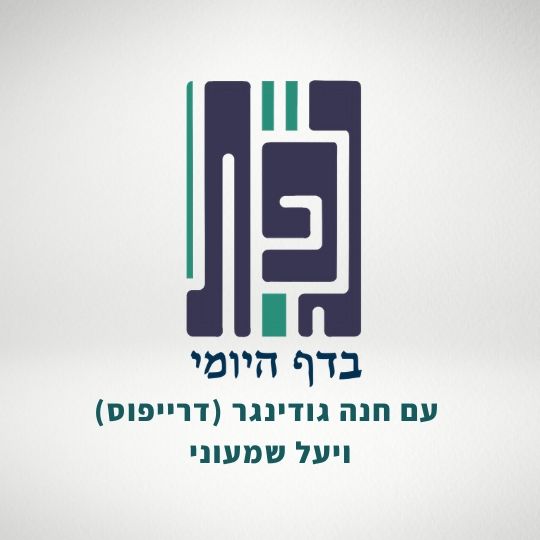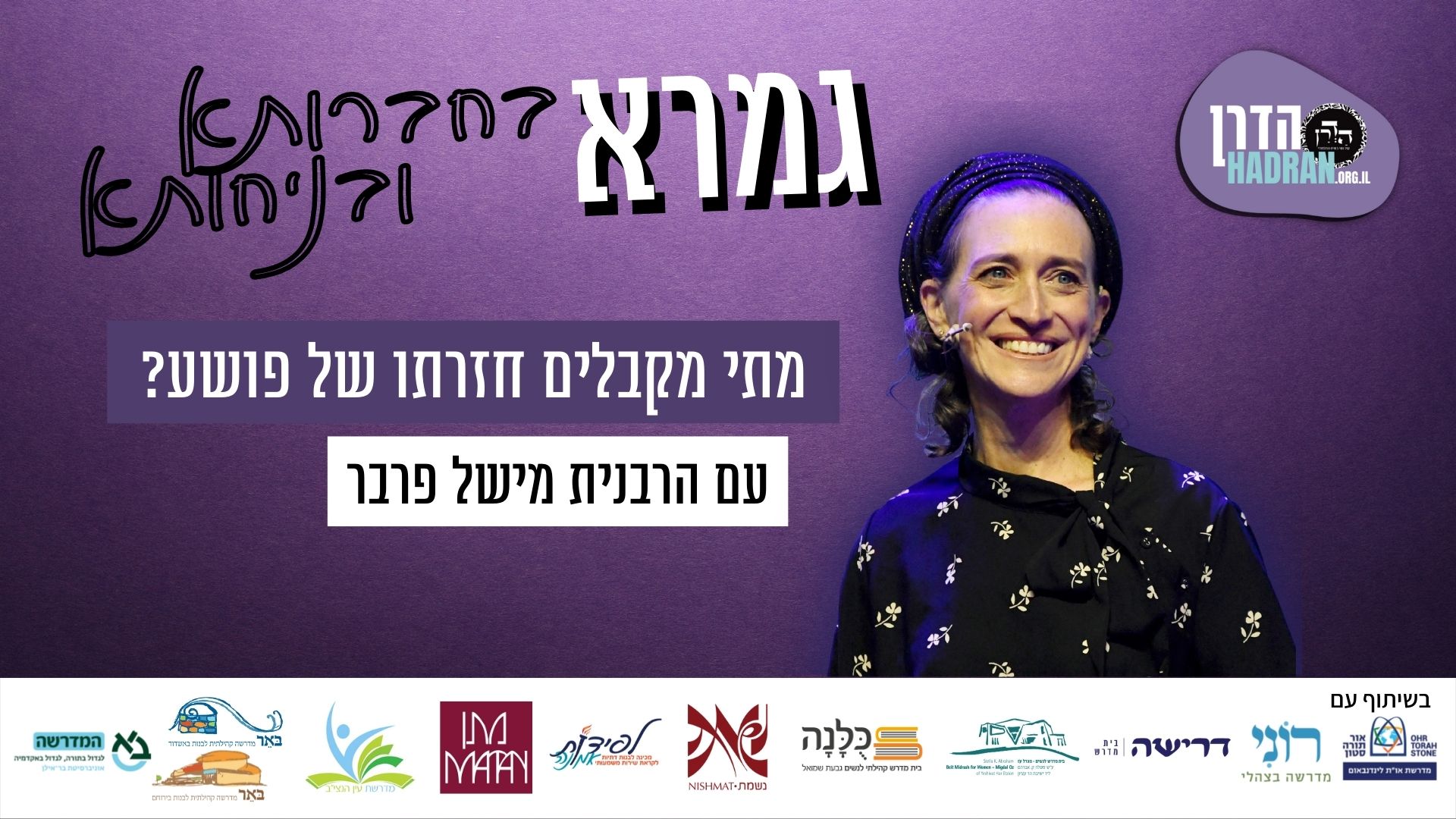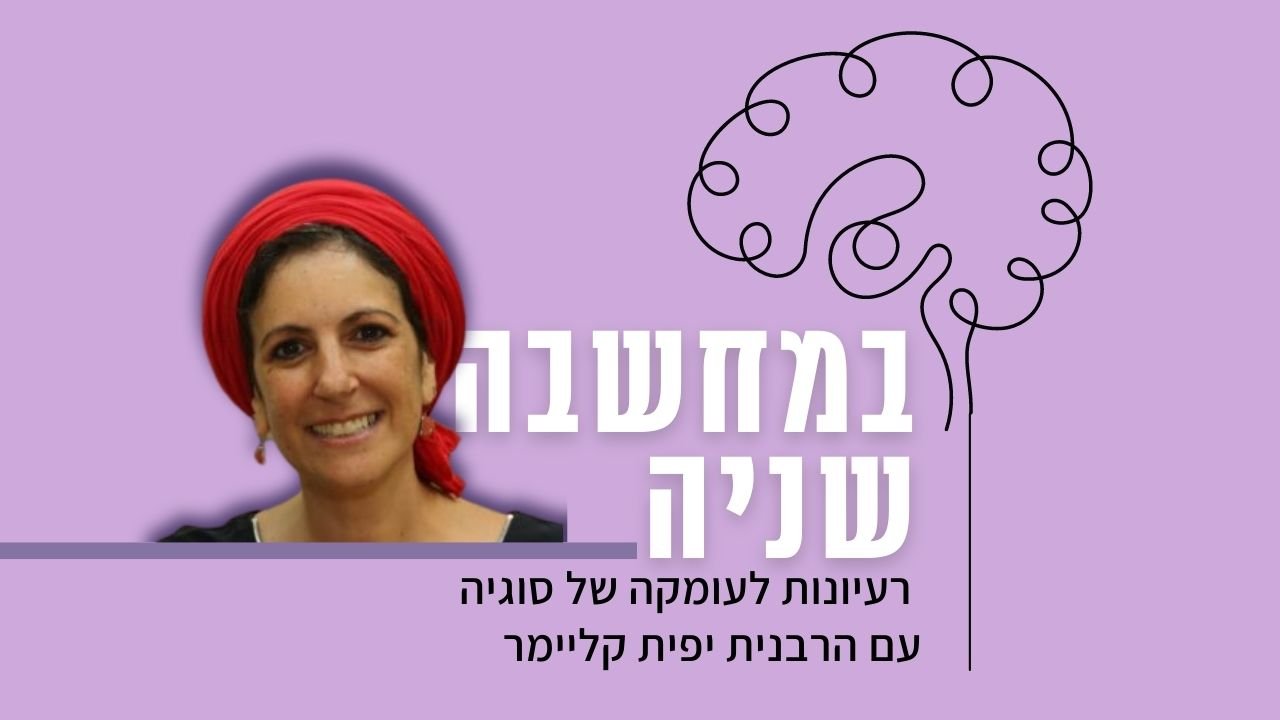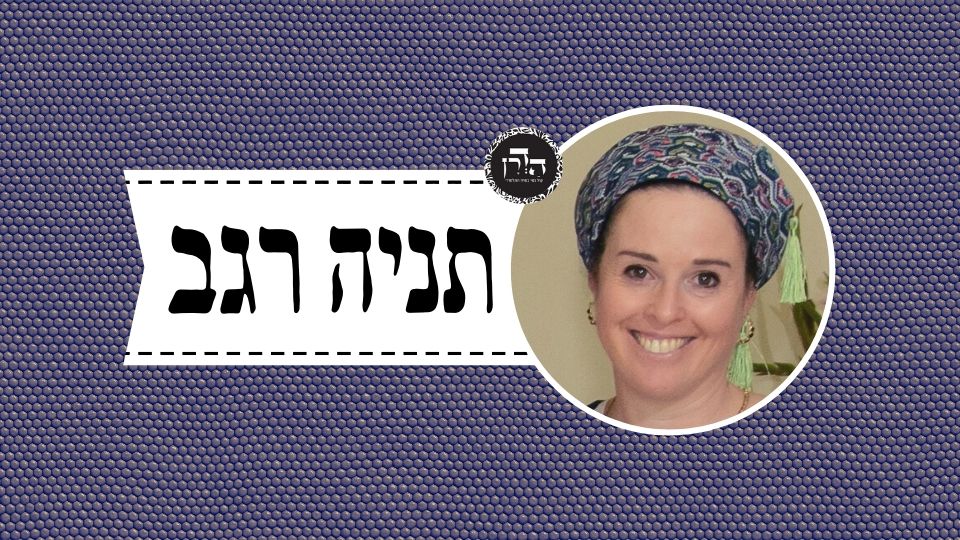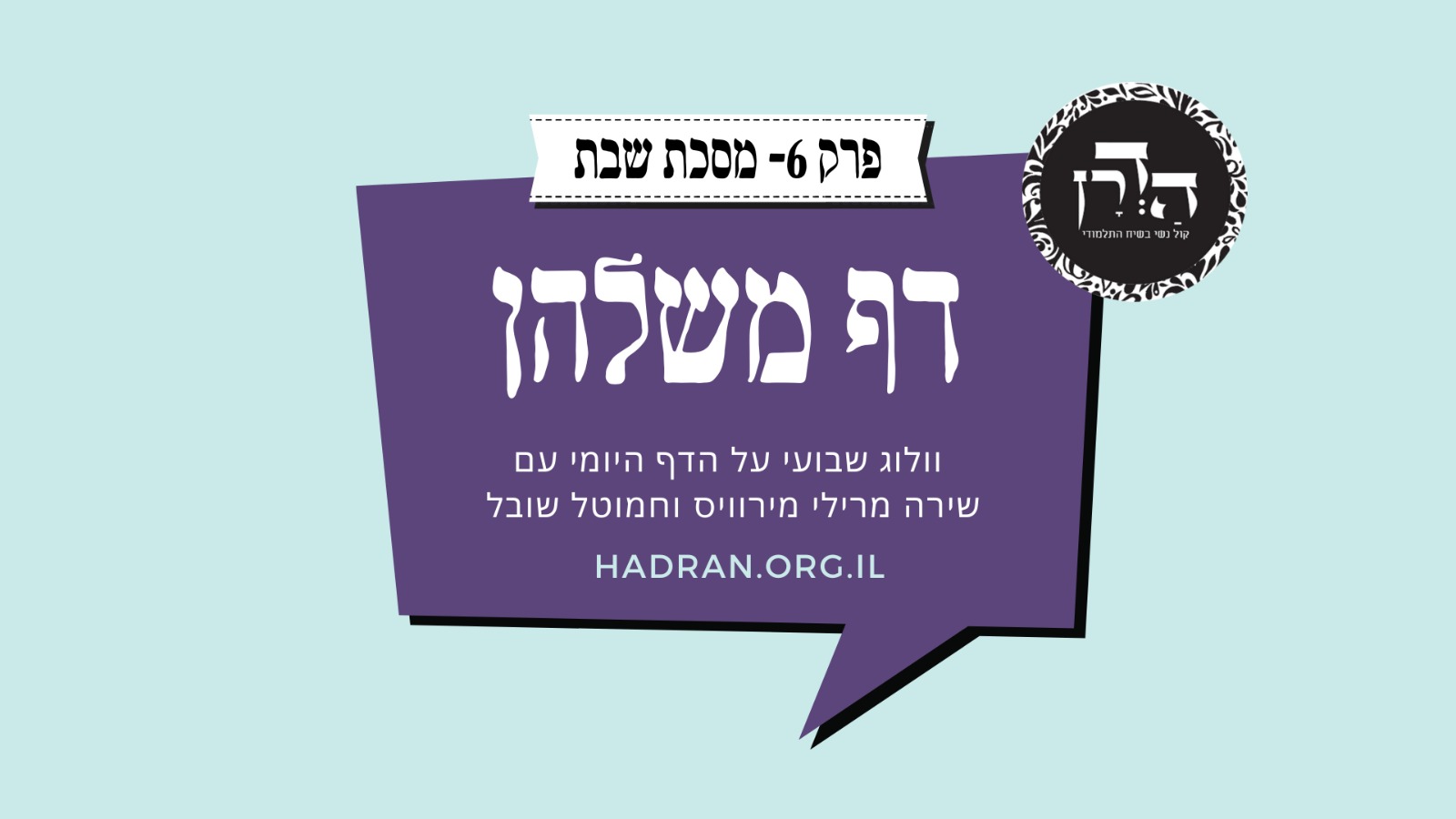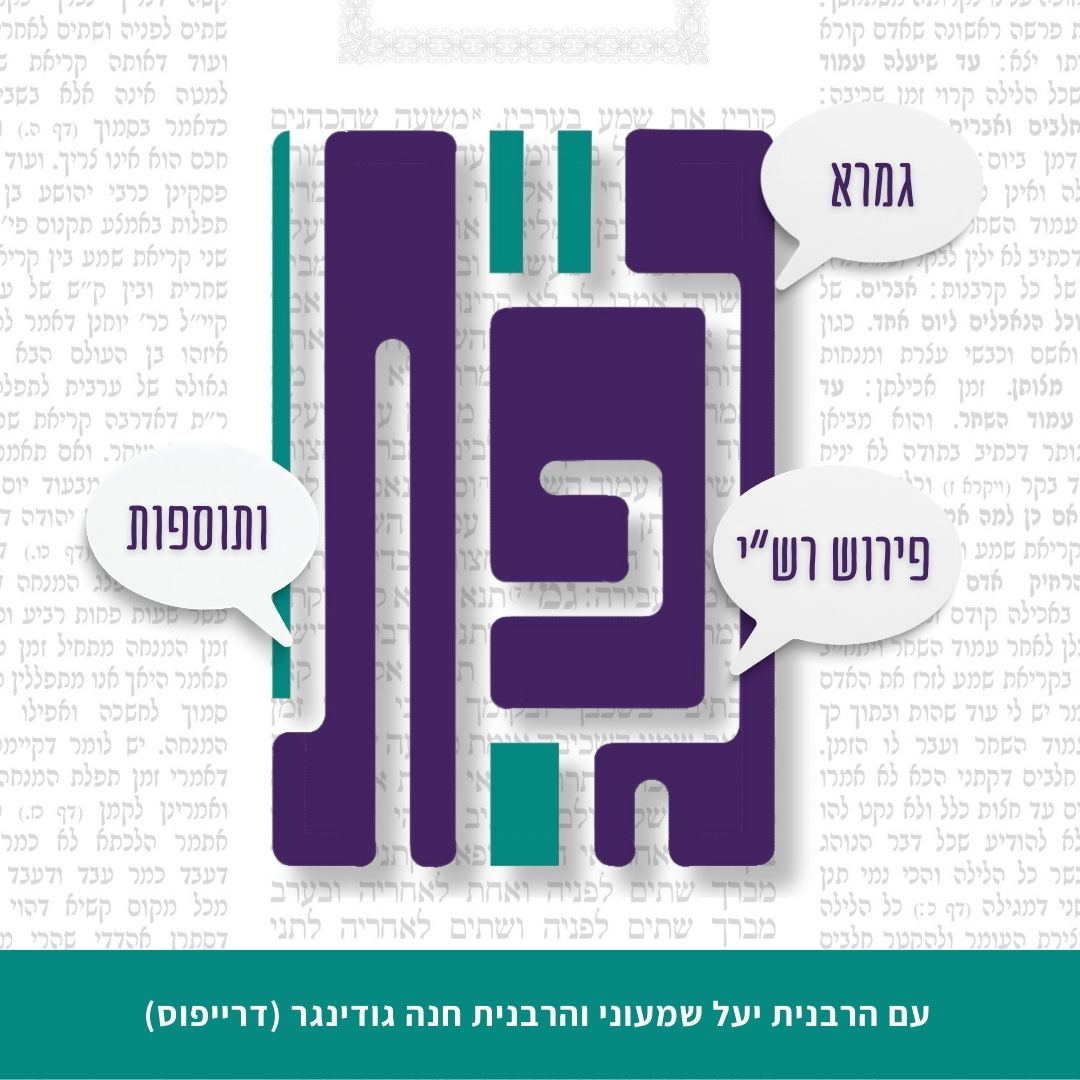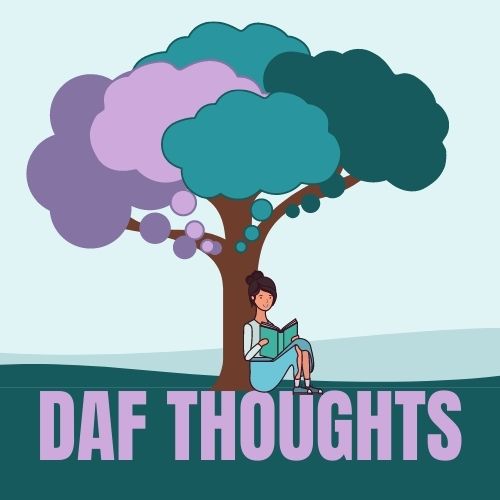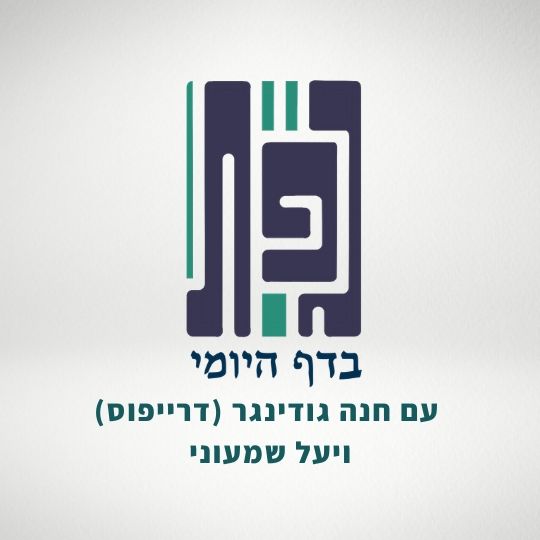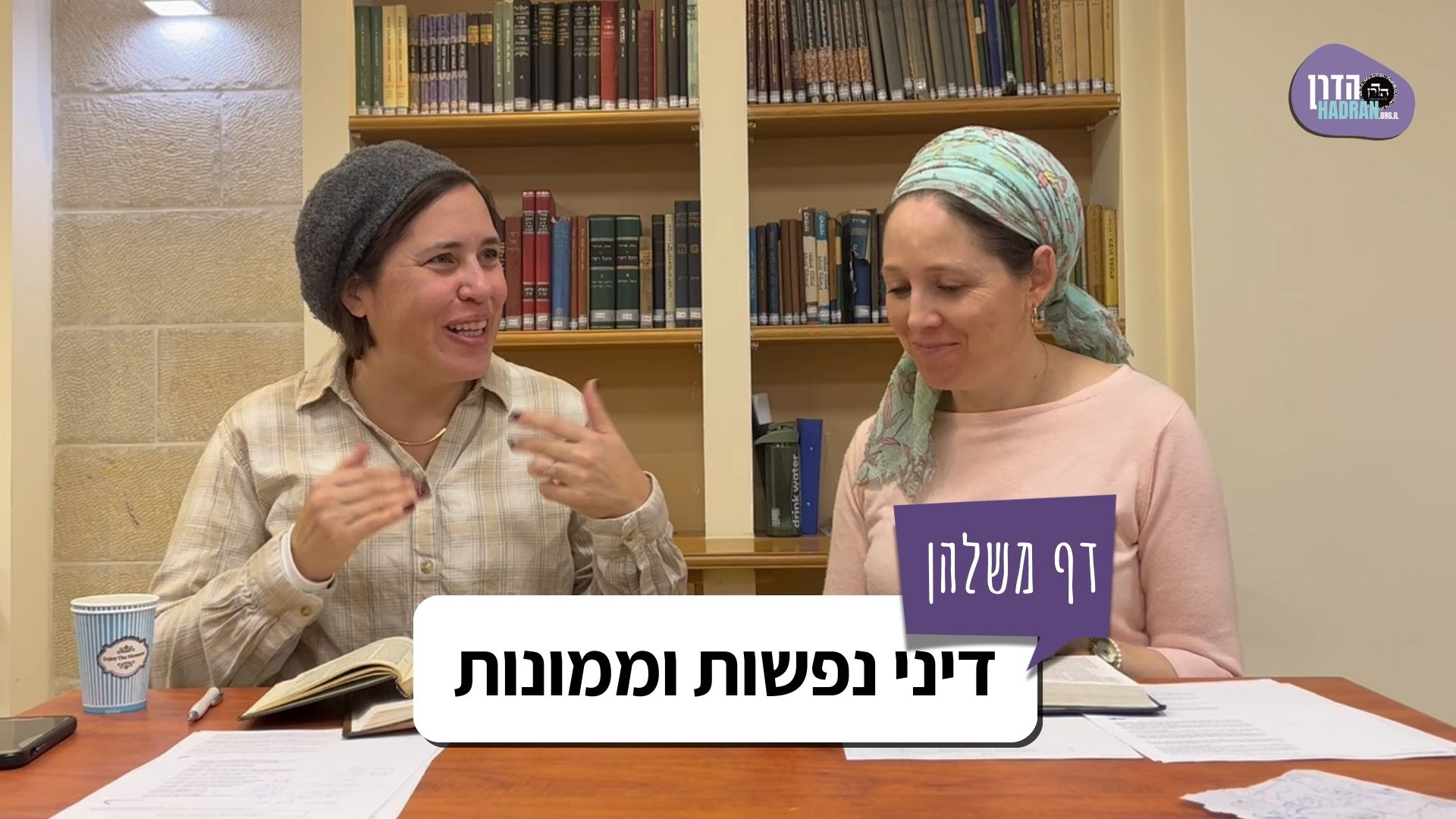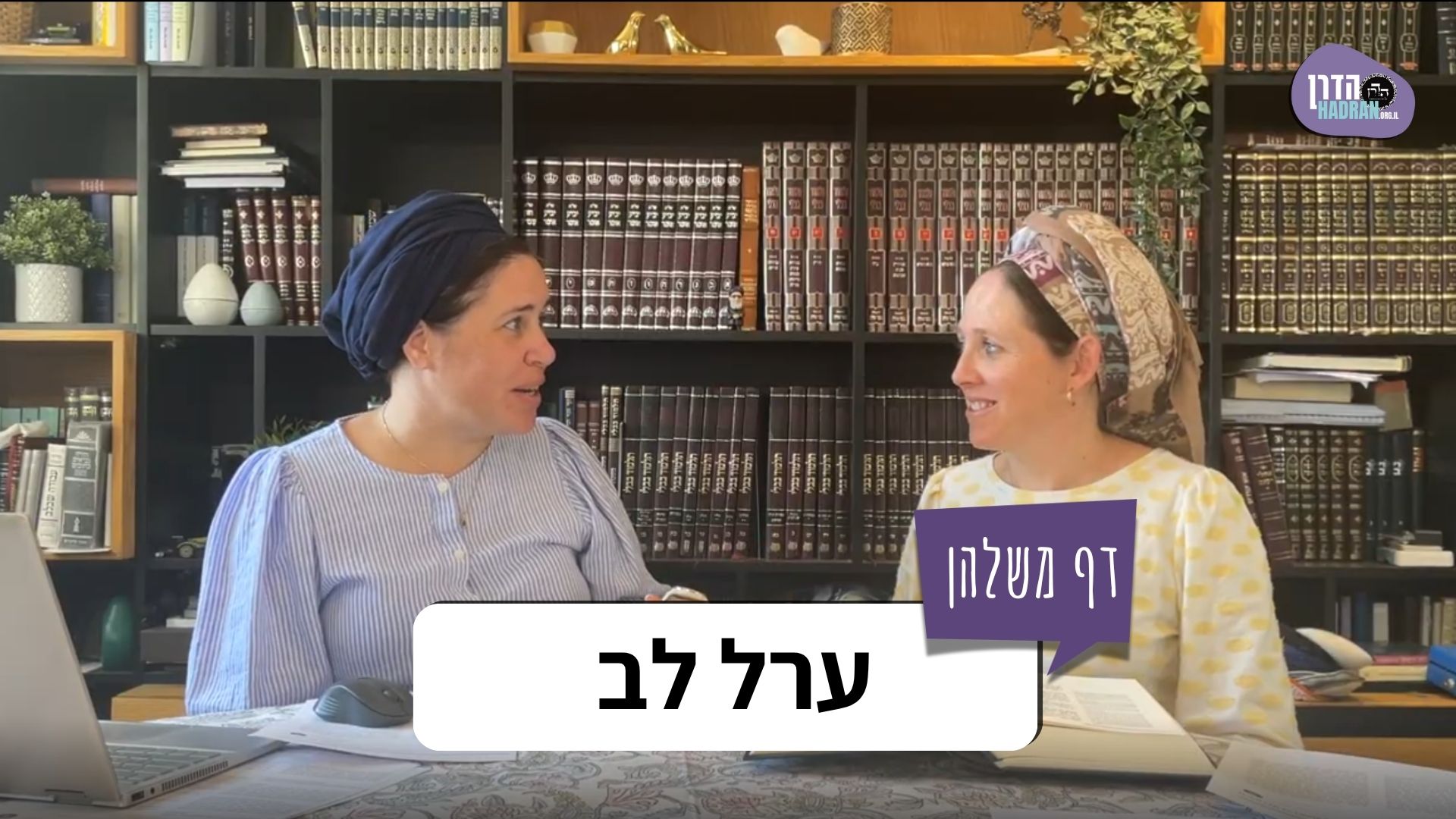ולד טריפה – קרבה או אינו קריבה לגבי המזבח – מה הבסיס למחלוקת? המשנה עורכת רשימת הבדלים בין קדשי מזבח לקדשי בדק הבית והגמרא מסבירה את ההבדלים ביניהם.
הלימוד השבוע מוקדש לזכות ולשלום הַיְימׇנוֹט אֱמוּנָה בַּת באנצ’י (קָסָאוּ) בת 11 שנעלמה במקום מגוריה בצפת, לפני שנתיים, ביום ט”ז אדר תשפ”ד (25.2.24), ולא נודעו עקבותיה.
רוצה להקדיש שיעור?

כלים
הלימוד השבוע מוקדש לזכות ולשלום הַיְימׇנוֹט אֱמוּנָה בַּת באנצ’י (קָסָאוּ) בת 11 שנעלמה במקום מגוריה בצפת, לפני שנתיים, ביום ט”ז אדר תשפ”ד (25.2.24), ולא נודעו עקבותיה.
כלים
העמקה
רוצה להבין מה באמת קורה מתחת לפני השטח של הסוגיה?
שיעורים, פודקאסטים והרחבות של מיטב המורות שלנו יפתחו לך עוד זוויות וכיווני חשיבה.
חדשה בלימוד הגמרא?
זה הדף הראשון שלך? איזו התרגשות עצומה! יש לנו בדיוק את התכנים והכלים שיעזרו לך לעשות את הצעדים הראשונים ללמידה בקצב וברמה שלך, כך תוכלי להרגיש בנוח גם בתוך הסוגיות המורכבות ומאתגרות.
פסיפס הלומדות שלנו
גלי את קהילת הלומדות שלנו, מגוון נשים, רקעים וסיפורים. כולן חלק מתנועה ומסע מרגש ועוצמתי.
תמורה לא
וְלַד טְרֵפָה כּוּ׳. לְמַאן דְּאָמַר טְרֵפָה (אינה) יָלְדָה — מַשְׁכַּחַתְּ לַהּ כְּגוֹן שֶׁנִּטְרְפָה וּלְבַסּוֹף עִיבְּרָה.
§ The mishna teaches that with regard to the offspring of a tereifa, Rabbi Eliezer prohibits it to be sacrificed on the altar, whereas the Rabbis permit it. The Gemara explains: There is a dispute as to whether a tereifa is capable of giving birth. According to the one who says that a tereifa can give birth, you find this dispute between Rabbi Eliezer and the Rabbis in a case where the animal first became a tereifa and then became pregnant.
וּבְהָא פְּלִיגִי, דְּרַבִּי אֱלִיעֶזֶר סָבַר: זֶה וָזֶה גּוֹרֵם אָסוּר, וְרַבָּנַן סָבְרִי: זֶה וָזֶה גּוֹרֵם מוּתָּר.
The Gemara elaborates: And this is the matter over which they disagree, as Rabbi Eliezer holds that when both this permitted factor and that prohibited factor cause a certain situation, the resulting item is prohibited. Here too, as the mother of this offspring is prohibited, the offspring is likewise prohibited, despite the fact that its father is permitted. And the Rabbis hold that when both this permitted factor and that prohibited factor cause a situation, the resulting item is permitted. Therefore, the offspring in this case is permitted like its father.
לְמַאן דְּאָמַר טְרֵיפָה אֵינָהּ חַיָּה, מַשְׁכַּחַתְּ לַהּ כְּגוֹן שֶׁעִיבְּרָה וּלְבַסּוֹף נִטְרְפָה, וּבְהָא פְּלִיגִי: דְּרַבִּי אֱלִיעֶזֶר סָבַר עוּבָּר יֶרֶךְ אִמּוֹ הוּא, וְרַבָּנַן סָבְרִי עוּבָּר לָאו יֶרֶךְ אִמּוֹ הוּא.
By contrast, according to the one who says that a tereifa cannot survive, i.e., cannot give birth, you find this dispute in a case where the animal first became pregnant and then became a tereifa. And this is the point over which they disagree, as Rabbi Eliezer holds that a fetus is considered the thigh of its mother, and therefore just as its mother is prohibited to be sacrificed on the altar as a tereifa, the same applies to its offspring. And the Rabbis hold that a fetus is not considered the thigh of its mother, and consequently there is no reason to prohibit it to be sacrificed on the altar.
אָמַר רַב הוּנָא: מוֹדִים חֲכָמִים לְרַבִּי אֱלִיעֶזֶר בְּאֶפְרוֹחַ בֵּיצַת טְרֵפָה שֶׁאָסוּר. מַאי טַעְמָא? עַד כָּאן לָא פְּלִיגִי עֲלֵיהּ דְּרַבִּי אֱלִיעֶזֶר אֶלָּא בִּוְלַד בְּהֵמָה, דְּמֵאַוֵּירָא קָא רָבְיָא, אֲבָל בֵּיצַת טְרֵפָה דְּמִגּוּפַהּ דְּתַרְנְגוֹלְתָּא קָא רָבְיָא — אֲפִילּוּ רַבָּנַן מוֹדוּ.
§ The Gemara continues to discuss the dispute between Rabbi Eliezer and the Rabbis. Rav Huna says: The Rabbis concede to Rabbi Eliezer in the case of a chick that emerges from the egg of a tereifa dove that it is prohibited to be sacrificed on the altar. What is the reason that the Rabbis rule stringently here? The Rabbis disagree with Rabbi Eliezer and claim that the offspring of a tereifa is permitted only with regard to the offspring of an animal, which grows from its own space, i.e., even when it is in its mother’s womb it develops as an independent entity. But with regard to an egg of a tereifa hen, which grows from the body of the hen, even the Rabbis concede that the chick which emerges from this egg may not be sacrificed on the altar.
אֲמַר לֵיהּ רָבָא לְרַב הוּנָא: תַּנְיָא דִּמְסַיַּיע לָךְ, מְלֹא תַּרְוָד רִימָּה הַבָּאָה מֵאָדָם חַי — רַבִּי אֱלִיעֶזֶר מְטַמֵּא, וַחֲכָמִים מְטַהֲרִין. עַד כָּאן לָא פְּלִיגִי רַבָּנַן עֲלֵיהּ אֶלָּא בְּרִימָּה, דְּפִירְשָׁא בְּעָלְמָא הוּא, אֲבָל בֵּיצָה דְּמִגּוּפַהּ דְּתַרְנְגוֹלֶת הוּא — אֲפִילּוּ רַבָּנַן מוֹדוּ.
Rava said to Rav Huna: That which is taught in a baraita supports your opinion: With regard to a full ladle [tarvad] of worms that come from a living person who subsequently died, Rabbi Eliezer holds that it transmits ritual impurity in the same manner as a corpse, as a full ladle is the minimum amount of dust from the dead that imparts impurity; and the Rabbis deem it pure. Rava analyzes this baraita: The Rabbis disagree with Rabbi Eliezer only with regard to worms, which are merely a secretion. But with regard to an egg, which is part of the hen’s body, even the Rabbis concede that in the case of a tereifa, the chick that emerges from the egg is prohibited to the altar.
אֲמַר לֵיהּ אַבָּיֵי: אַדְּרַבָּה, אִיפְּכָא מִסְתַּבְּרָא — עַד כָּאן לָא פְּלִיג רַבִּי אֱלִיעֶזֶר עֲלַיְיהוּ דְּרַבָּנַן אֶלָּא בְּרִימָּה, דְּאִיקְּרִי אָדָם מֵחַיִּים ״רִימָּה״, דִּכְתִיב: ״וְתִקְוַת אֱנוֹשׁ רִמָּה וּבֶן אָדָם תּוֹלֵעָה״.
Abaye said to Rava: No proof can be brought from here for the opinion of Rav Huna, as on the contrary, the opposite is reasonable: Rabbi Eliezer disagrees with the Rabbis only with regard to worms, as he maintains that worms are considered part of a person even if they emerged from him while he was still alive, as a person is called a worm while he is still alive, as it is written: And the hope of man is a worm, and the son of man, that is a maggot (see Job 25:6).
אֲבָל גַּבֵּי בֵּיצָה, אֵימַת גָּדְלָה? לְכִי מַסְרְחָא, וְכִי אַסְרַחָא — עַפְרָא בְּעָלְמָא הוּא, אֲפִילּוּ רַבִּי אֱלִיעֶזֶר מוֹדֶה! וְעוֹד, תַּנְיָא בְּהֶדְיָא: מוֹדֶה רַבִּי אֱלִיעֶזֶר לַחֲכָמִים בְּאֶפְרוֹחַ בֵּיצַת טְרֵפָה שֶׁמּוּתָּר! אֲמַר לֵיהּ: אִי תַּנְיָא — תַּנְיָא.
But with regard to a chick that emerges from an egg, one can say: When does the chick grow out of and emerge from the egg? It does so when the egg rots, and when it rots it is considered merely dust and is no longer attributed to the hen that laid it. Therefore, despite the fact that the hen is a tereifa, even Rabbi Eliezer should concede that the chick that emerges from its egg is permitted to be sacrificed. And furthermore, it is explicitly taught in a baraita that Rabbi Eliezer concedes to the Rabbis with regard to the chick that emerged from the egg of a tereifa animal that it is permitted to be sacrificed on the altar, which is not in accordance with the opinion of Rav Huna. Rava said to Abaye: If this baraita is taught, it is taught, and I cannot take issue with it.
רַבִּי חֲנִינָא בֶּן אַנְטִיגְנוֹס אוֹמֵר: כְּשֵׁרָה כּוּ׳. מַאי טַעְמָא? אִילֵּימָא דְּמִפַּטְמָא מִינַּהּ, אֶלָּא מֵעַתָּה הֶאֱכִילָהּ כַּרְשִׁינֵי עֲבוֹדָה זָרָה, הָכִי נָמֵי דַּאֲסִירָא?
§ The mishna teaches that Rabbi Ḥanina ben Antigonus says: A kosher animal that suckled from a tereifa is disqualified from being sacrificed on the altar. The Gemara asks: What is the reason? If we say that it is because the kosher animal was fattened from the tereifa animal, if that is so, then in a case where its owner fed it vetches of idolatry, so too, should one say that it is prohibited? Feeding an animal vetches of idolatry renders it prohibited only if the animal has been set aside for idolatry; a regular animal is not prohibited by this action.
אֶלָּא, תָּנֵי רַבִּי חֲנִינָא טְרִיטָאָה קַמֵּיהּ דְּרַבִּי יוֹחָנָן: כְּגוֹן שֶׁהֱנִיקָהּ חָלָב רוֹתֵחַ מִשַּׁחֲרִית לְשַׁחֲרִית, הוֹאִיל וִיכוֹלָה לַעֲמוֹד עָלֶיהָ מֵעֵת לְעֵת.
Rather, Rabbi Ḥanina Terita taught the meaning of the mishna before Rabbi Yoḥanan: This is referring to a case where one gave the kosher animal to suckle from the tereifa warm, i.e., fresh, milk every morning. Since the kosher animal can maintain its existence based upon this suckling for a twenty-four-hour period, until the next suckling, it survives only due to the tereifa animal. Consequently, the kosher animal is prohibited to be sacrificed on the altar.
כָּל הַקֳּדָשִׁים שֶׁנַּעֲשׂוּ טְרֵפָה אֵין פּוֹדִין כּוּ׳. מְנָא הָנֵי מִילֵּי? דְּתָנוּ רַבָּנַן: ״תִּזְבַּח״ — וְלֹא גִּיזָּה, ״וְאָכַלְתָּ״ — וְלֹא לִכְלָבֶיךָ, ״בָּשָׂר״ — וְלֹא חָלָב. מִכָּאן שֶׁאֵין פּוֹדִים אֶת הַקֳּדָשִׁים לְהַאֲכִילָן לִכְלָבִים.
§ The mishna further teaches: With regard to all sacrificial animals that became tereifa, one may not redeem them and render them non-sacred, as their consumption is prohibited, and one does not redeem sacrificial animals to feed them to dogs. The Gemara asks: From where are these matters derived? As the Sages taught with regard to the verse: “Notwithstanding you may slaughter and eat flesh within all your gates” (Deuteronomy 12:15). This verse, which is referring to disqualified consecrated animals that have been redeemed, is expounded as follows: “You may slaughter,” but you may not shear their wool; “and eat,” but you may not give to your dogs to eat; “and eat flesh,” but not their milk. From here it is derived that one does not redeem sacrificial animals to feed them to dogs.
אִיכָּא דְאָמְרִי: ״תִּזְבַּח וְאָכַלְתָּ״ — אֵין לְךָ בָּהֶן הֶיתֵּר אֶלָּא מִשְּׁעַת זְבִיחָה וְאֵילָךְ, קָסָבַר: פּוֹדִין אֶת הַקֳּדָשִׁים לְהַאֲכִילָן לִכְלָבִים.
There are those who state a different version: “You may slaughter and eat,” this teaches that you have permission to derive benefit from them only from the time of slaughter and onward, i.e., those benefits that come after slaughter, such as the consumption of its flesh, are permitted. But one may not derive benefit from their shearing or their milk, as these occur even when the animal is alive. It can be inferred from here that the tanna of this baraita maintains that one may redeem sacrificial animals to feed them to dogs, as this occurs after the slaughter.
הֲדַרַן עֲלָךְ כָּל הָאֲסוּרִין.
מַתְנִי׳ יֵשׁ בְּקׇדְשֵׁי מִזְבֵּחַ שֶׁאֵין בְּקׇדְשֵׁי בֶּדֶק הַבַּיִת, וְיֵשׁ בְּקׇדְשֵׁי בֶּדֶק הַבַּיִת שֶׁאֵין בְּקׇדְשֵׁי מִזְבֵּחַ.
MISHNA: There are elements that apply to animals consecrated for the altar that do not apply to items consecrated for Temple maintenance, and there are elements that apply to items consecrated for Temple maintenance that do not apply to animals consecrated for the altar.
שֶׁקׇּדְשֵׁי מִזְבֵּחַ עוֹשִׂין תְּמוּרָה, וְקׇדְשֵׁי בֶּדֶק הַבַּיִת אֵין עוֹשִׂין תְּמוּרָה. קׇדְשֵׁי מִזְבֵּחַ חַיָּיבִין (עָלָיו) [עֲלֵיהֶן] מִשּׁוּם פִּיגּוּל, נוֹתָר, וְטָמֵא,
One element exclusive to animals consecrated for the altar is that animals consecrated for the altar render an animal exchanged for them a substitute, and items consecrated for Temple maintenance do not render an animal exchanged for them a substitute. In addition, if one slaughters an animal consecrated for the altar with the intention to eat it beyond its designated time, or if he ate the offering after its designated time, or if he ate the offering while ritually impure, he is liable to receive karet for eating it due to violation of the prohibitions of piggul, notar, and eating while ritually impure, respectively.
וְלָדָן וַחֲלָבָן אָסוּר לְאַחַר פִּדְיוֹנָן, וְהַשּׁוֹחֲטָן בַּחוּץ חַיָּיב. אֵין נוֹתְנִין מֵהֶן לָאוּמָּנִין בִּשְׂכָרָן — מָה שֶׁאֵין כֵּן בְּקׇדְשֵׁי בֶּדֶק הַבַּיִת.
If animals consecrated for the altar became pregnant and then became blemished and gave birth after redemption, their offspring and their milk are forbidden after their redemption. And one who slaughters them outside the Temple courtyard is liable to receive karet. And the Temple treasurer does not give compensation to craftsmen from money designated for purchasing animals consecrated for the altar. And in all these instances, that is not so with regard to money consecrated for Temple maintenance.
יֵשׁ בְּקׇדְשֵׁי בֶּדֶק הַבַּיִת, שֶׁסְּתַם הֶקְדֵּשׁוֹת לְבֶדֶק הַבַּיִת, הֶקְדֵּשׁ בֶּדֶק הַבַּיִת חָל עַל הַכֹּל, וּמוֹעֲלִין בְּגִידּוּלֵיהֶן, וְאֵין בָּהֶן הֲנָאָה לַבְּעָלִים.
There are elements that apply to items consecrated for Temple maintenance that do not apply to animals consecrated for the altar, in that unspecified consecrations are designated for Temple maintenance; consecration for Temple maintenance takes effect on all items; and one is liable to bring a guilt offering and pay an additional payment of one-fifth for misuse of consecrated property, not only for the items themselves, but for their by-products, e.g., milk of a consecrated animal or eggs of a consecrated chicken; and there is no benefit for the owner from items consecrated for Temple maintenance, in contrast to some animals consecrated for the altar, e.g., a peace offering, from which there is benefit for the owner.
גְּמָ׳ וּכְלָלָא הוּא דְּכׇל קׇדְשֵׁי מִזְבֵּחַ עוֹשִׂין תְּמוּרָה? וַהֲרֵי עוֹפוֹת דְּקׇדְשֵׁי מִזְבֵּחַ הֵן, וּתְנַן: הַמְּנָחוֹת וְהָעוֹפוֹת אֵין עוֹשִׂין תְּמוּרָה! כִּי קָתָנֵי — אַבְּהֵמָה.
GEMARA: The Gemara questions the statement of the mishna that an item consecrated for the altar renders an animal exchanged for it a substitute: And is it an established principle that anything consecrated for the altar renders an animal exchanged for it a substitute? But there are offerings brought from birds, i.e., doves and pigeons, which are consecrated for the altar, and yet they do not render an animal exchanged for them a substitute, as we learned in a mishna (Temura 13a): Meal offerings and bird offerings do not render an animal exchanged for them a substitute. The Gemara responds: When this halakha of the mishna was taught, it was taught only with regard to animal offerings.
וַהֲרֵי וָלָד קׇדְשֵׁי מִזְבֵּחַ הוּא, וּתְנַן: אֵין הַוָּלָד עוֹשֶׂה תְּמוּרָה. הָא מַנִּי? רַבִּי יְהוּדָה הִיא, דְּאָמַר: וָלָד עוֹשֶׂה תְּמוּרָה.
The Gemara raises a difficulty: But there is the offspring of an animal consecrated for the altar, which is consecrated for the altar, and yet we learned in a mishna (Temura 12a): The offspring of an animal consecrated for the altar does not render an animal exchanged for it a substitute. The Gemara responds: In accordance with whose opinion is this mishna here (31a)? It is in accordance with the opinion of Rabbi Yehuda, who says: The offspring of an animal consecrated for the altar renders an animal exchanged for it a substitute.
וַהֲרֵי תְּמוּרָה עַצְמָהּ, דְּקׇדְשֵׁי מִזְבֵּחַ, וּתְנַן: אֵין תְּמוּרָה עוֹשָׂה תְּמוּרָה! כִּי קָתָנֵי — אַעִיקַּר זִיבְחָא.
The Gemara objects: But there is the case of a substitute itself, which is consecrated for the altar, and yet we learned in that mishna (12a): A substitute does not render an animal exchanged for it a substitute. The Gemara responds: When this principle, that all animals consecrated for the altar render an animal exchanged for them a substitute, was taught in the mishna, it was taught only with regard to the principal offering, i.e., an animal initially consecrated as an offering, not an animal consecrated by extension, e.g., a substitute.
הַשְׁתָּא דַאֲתֵית לְהָכִי, אֲפִילּוּ תֵּימָא רַבָּנַן, כִּי קָתָנֵי — אַעִיקַּר זִיבְחָא.
The Gemara comments: Now that you have arrived at this qualification of the established principle, one does not need to resolve the difficulty from the case of offspring of consecrated animals by saying that the mishna is in accordance with the opinion of Rabbi Yehuda. Rather, you may even say that the mishna is in accordance with the opinion of the Rabbis, who maintain that the offspring of an animal does not render an animal exchanged for it a substitute, since when this principle was taught in the mishna it was taught only with regard to the principal offering.
וְאֵין נוֹתְנִין מֵהֶן לָאוּמָּנִין כּוּ׳. הָא קׇדְשֵׁי בֶּדֶק הַבַּיִת נוֹתְנִין? אָמַר רַבִּי אֲבָהוּ: דְּאָמַר קְרָא ״וְעָשׂוּ לִי״ — מִשֶּׁלִּי.
§ The mishna teaches that the Temple treasurer does not give craftsmen compensation from money designated for purchasing animals consecrated for the altar. The Gemara asks: It may be inferred from the mishna that consecrations for Temple maintenance are given to craftsmen. From where is this halakha derived? Rabbi Abbahu said: It is derived from a verse, as the verse states, with regard to the mitzva to build the Tabernacle: “And let them make Me a sanctuary, that I may dwell among them” (Exodus 25:8). The verse indicates that the Tabernacle can be constructed from that which is Mine, i.e., consecrated property. Consequently, consecrated property may be used to pay the wages of a craftsman for work performed in the service of the Tabernacle.
יֵשׁ בְּקׇדְשֵׁי בֶּדֶק הַבַּיִת כּוּ׳. אָמַר מָר: סְתָם הֶקְדֵּשׁוֹת לְבֶדֶק הַבַּיִת, וְחָל עַל הַכֹּל. מַאן תַּנָּא? אָמַר רַבִּי חִיָּיא בַּר אַבָּא אָמַר רַבִּי יוֹחָנָן: דְּלָא כְּרַבִּי יְהוֹשֻׁעַ.
§ The mishna teaches that there are elements that apply to items consecrated for Temple maintenance that do not apply to animals consecrated for the altar, as unspecified consecrations are designated for Temple maintenance rather than for the altar. Additionally, consecration for Temple maintenance takes effect on all items, but not all items may be consecrated for the altar. The Gemara discusses these halakhot: The Master said in the mishna that unspecified consecrations are designated for Temple maintenance, and consecration for Temple maintenance takes effect on all items. Who is the tanna whose ruling is stated in this mishna? Rabbi Ḥiyya bar Abba said that Rabbi Yoḥanan said: The mishna is not in accordance with the opinion of Rabbi Yehoshua.
דְּתַנְיָא: הַמַּקְדִּישׁ נְכָסָיו, וְהָיָה בָּהֶן בְּהֵמָה רְאוּיָה לְגַבֵּי מִזְבֵּחַ, זְכָרִים וּנְקֵבוֹת — רַבִּי אֱלִיעֶזֶר אוֹמֵר: זְכָרִים יִמָּכְרוּ לְצׇרְכֵי עוֹלוֹת, וּנְקֵבוֹת יִמָּכְרוּ לְצׇרְכֵי שְׁלָמִים, וּדְמֵיהֶן יִפְּלוּ עִם שְׁאָר נְכָסִים לְבֶדֶק הַבַּיִת.
This is as it is taught in a mishna (Shekalim 4:7): In the case of one who consecrates his possessions without specification, and among the consecrated property there was an animal suitable for sacrifice upon the altar, male or female, what should be done with it? Rabbi Eliezer says: Males that are suitable to be brought as a burnt offerings should be sold for the needs of burnt offerings, i.e., to individuals obligated to bring a burnt offering. And females should be sold for the purpose of being used for peace offerings. And the money received from their sale is allocated with the rest of his property for Temple maintenance.
רַבִּי יְהוֹשֻׁעַ אוֹמֵר: זְכָרִים הֵן עַצְמָן יִקְרְבוּ עוֹלוֹת, וּנְקֵבוֹת יִמָּכְרוּ לְצׇרְכֵי שְׁלָמִים וְיָבִיא בִּדְמֵיהֶן עוֹלוֹת, וּשְׁאָר נְכָסִים לְבֶדֶק הַבַּיִת.
Rabbi Yehoshua says: The males are not sold; rather, they themselves should be sacrificed as burnt offerings, and the females should be sold for the purpose of being used for peace offerings and they will be offered as such, and one should purchase and bring burnt offerings with the money received from their sale. And the rest of the property, which is unsuitable for sacrificial use, is allocated for Temple maintenance. Evidently, Rabbi Yehoshua maintains that unspecified consecrations are not necessarily designated for Temple maintenance.
וּפְלִיגָא דְּרַב אַדָּא בַּר אַהֲבָה, דְּאָמַר רַב אַדָּא בַּר אַהֲבָה אָמַר רַב: בְּעֵדֶר שֶׁכּוּלּוֹ זְכָרִים, אֲפִילּוּ רַבִּי אֱלִיעֶזֶר מוֹדֶה, דְּלָא שָׁבֵיק אִינִישׁ קׇדְשֵׁי מִזְבֵּחַ וּמַקְדִּישׁ לְבֶדֶק הַבַּיִת.
The Gemara notes: And this explanation of the dispute between Rabbi Eliezer and Rabbi Yehoshua, stated by Rabbi Ḥiyya bar Abba in the name of Rabbi Yoḥanan, disagrees with the explanation of Rav Adda bar Ahava. As Rav Adda bar Ahava says that Rav says: With regard to a herd that is entirely male, even Rabbi Eliezer concedes that suitable animals are brought as burnt offerings, as a person does not set aside his ability to consecrate to the altar an animal fit to be consecrated for the altar and instead consecrate it for Temple maintenance. Even if the owner consecrated these animals without specification, it is presumed that he consecrated them for sacrifice upon the altar.
לֹא נֶחְלְקוּ אֶלָּא בְּעֵדֶר שֶׁיֵּשׁ בּוֹ מֶחֱצָה זְכָרִים וּמֶחֱצָה נְקֵבוֹת, וְרַבִּי אֱלִיעֶזֶר סָבַר: אֵין חוֹלֵק אֶת נִדְרוֹ, וּמִדִּנְקֵבוֹת לָאו עוֹלוֹת — זְכָרִים נָמֵי לָאו עוֹלוֹת.
Rabbi Eliezer and Rabbi Yehoshua disagree only with regard to a case where one consecrates a herd that has one-half males and one-half females. And their dispute is as follows: Rabbi Eliezer holds that one does not divide his vow, i.e., state a single vow that must be fulfilled in different ways, and therefore, from the fact that the females are not consecrated as burnt offerings, as burnt offerings must be male, it must be that the males are also not consecrated as burnt offerings.
וְרַבִּי יְהוֹשֻׁעַ סָבַר: חוֹלֵק אֶת נִדְרוֹ.
And Rabbi Yehoshua holds that a person does divide his vow. Accordingly, the males, which are fit to be brought as burnt offerings, are consecrated for the altar, whereas the females are sold to those who must bring peace offerings, and the money from their sale is used to purchase burnt offerings. According to this interpretation, Rabbi Eliezer concedes that one does not consecrate for Temple maintenance an animal fit for the altar. Consequently, the mishna is not in accordance with the opinion of Rabbi Eliezer either.
לִישָּׁנָא אַחְרִינָא אָמְרִי לַהּ, אָמַר רַב אַדָּא בַּר אַהֲבָה אָמַר רַב: בְּשֶׁלֹּא הִקְדִּישׁ אֶלָּא בְּהֵמָה, אֲפִילּוּ רַבִּי אֱלִיעֶזֶר מוֹדֶה, דְּלָא שָׁבֵיק אִינִישׁ קׇדְשֵׁי מִזְבֵּחַ וּמַקְדֵּישׁ לְבֶדֶק הַבַּיִת.
The Gemara adds: Some say another version of the explanation of the dispute between Rabbi Eliezer and Rabbi Yehoshua. Rav Adda bar Ahava says that Rav says: In a case where one consecrated without specification only the type of animal that is suitable as an offering, even Rabbi Eliezer concedes that all the animals are consecrated for the altar. Accordingly, the males are brought as burnt offerings, and the females are sold to those who require peace offerings, and the money from their sale is used to purchase burnt offerings. The reason is that a person does not set aside his ability to consecrate for the altar an animal fit to be consecrated for the altar and instead consecrate it for Temple maintenance.
לֹא נֶחְלְקוּ אֶלָּא כְּשֶׁיֵּשׁ שְׁאָר נְכָסִים עִמָּהֶן, וְרַבִּי אֱלִיעֶזֶר סָבַר: אֵין אָדָם חוֹלֵק אֶת נִדְרוֹ, מִדִּשְׁאָר נְכָסִים לָא לְקׇדְשֵׁי מִזְבַּח, בְּהֵמָה נָמֵי לָא לְקׇדְשֵׁי מִזְבֵּחַ, וְרַבִּי יְהוֹשֻׁעַ סָבַר: אָדָם חוֹלֵק אֶת נִדְרוֹ.
They disagree only with regard to a case where there is other property that was consecrated with the animals. And their dispute is as follows: Rabbi Eliezer holds that a person does not divide his vow. Consequently, from the fact that the other property is not consecrated for the altar, as it is not fit for sacrifice, it must be that the animals are also not consecrated for the altar. And Rabbi Yehoshua holds that a person divides his vow. Accordingly, the animals are consecrated for the altar, while the other property is consecrated for Temple maintenance. According to this explanation as well, the mishna is not in accordance with the opinions of either Rabbi Yehoshua or Rabbi Eliezer.
וּדְמֵיהֶן יִפְּלוּ עִם שְׁאָר נְכָסִים לְבֶדֶק הַבַּיִת — בִּשְׁלָמָא לְלִישָּׁנָא בָּתְרָא, הַיְינוּ דְּקָתָנֵי: ״עִם שְׁאָר נְכָסִים לְבֶדֶק הַבַּיִת״.
The Gemara discusses the two versions of the explanation of Rav Adda bar Ahava, in light of the statement of Rabbi Eliezer in the mishna cited above in Shekalim (4:7): And the money from their sale is allocated with the rest of his property for Temple maintenance. The Gemara asks: Granted, according to the latter version, that Rabbi Eliezer maintains that when one consecrates animals and other property he does not divide his vow, and as some of his property is unfit for the altar, all of his property is consecrated for Temple maintenance, this explanation is consistent with that which Rabbi Eliezer teaches: The money from their sale is allocated with the rest of his property for Temple maintenance, i.e., the money from their sale is consecrated for Temple maintenance due to the consecration of his other property.
אֶלָּא לְלִישָּׁנָא קַמָּא, לִיתְנֵי ״יִפְּלוּ לְבֶדֶק הַבַּיִת״! תַּנְיָא נָמֵי הָכִי: ״וּדְמֵיהֶן יִפְּלוּ לְבֶדֶק הַבַּיִת״.
But according to the first version, that Rabbi Eliezer maintains that one does not divide his vow even when he consecrates only animals, i.e., he does not consecrate some as burnt offerings and others as peace offerings, let the mishna teach: The money from their sale is allocated for Temple maintenance, without mentioning the rest of his property. The Gemara responds: Indeed, the mishna should be taught in such a manner, and this is also taught in a baraita: And the money from their sale is allocated for Temple maintenance.
הֶקְדֵּשׁ בֶּדֶק הַבַּיִת חָל עַל הַכֹּל. לְאֵיתוֹיֵי מַאי? אָמַר רָבִינָא: לְאֵיתוֹיֵי שִׁפּוּיֵי וְנִיבָא.
§ The mishna teaches that consecration for Temple maintenance takes effect on all items. This emphasis indicates that it takes effect even on items that one might otherwise have thought are not consecrated. The Gemara asks: What does the mishna mean to add by this emphasis? Ravina said: It means to add shavings and fallen leaves of a tree that was consecrated for Temple maintenance.
וּמוֹעֲלִין בְּגִידּוּלֵיהֶן. לְאֵתוֹיֵי מַאי? אָמַר רַב פָּפָּא: לְאֵתוֹיֵי בִּקְדוּשַּׁת מִזְבֵּחַ, חֲלֵב הַמּוּקְדָּשִׁין וּבֵיצֵי תוֹרִין.
The mishna further teaches that one is liable for misuse of items consecrated for Temple maintenance and for their by-products, but one is not liable for misuse of by-products of animals consecrated for the altar. The Gemara elaborates: When the mishna states that one is not liable for misuse of by-products of animals consecrated for the altar, this serves to add what? Rav Pappa said: It serves to add that one is not liable for misuse of by-products of animals consecrated for the altar, such as milk from sacrificial animals and eggs of pigeons.
כִּדְתַנְיָא: חֲלֵב הַמּוּקְדָּשִׁין וּבֵיצֵי תוֹרִין — לֹא נֶהֱנִין וְלֹא מוֹעֲלִין. בַּמֶּה דְבָרִים אֲמוּרִים? בְּקׇדְשֵׁי מִזְבֵּחַ, אֲבָל בְּקׇדְשֵׁי בֶּדֶק הַבַּיִת — הִקְדִּישׁ תַּרְנְגוֹלֶת מוֹעֲלִין בְּבֵיצָתָהּ, חֲמוֹרָהּ מוֹעֲלִין בַּחֲלָבָהּ.
This is as it is taught in a baraita: With regard to milk of sacrificial animals and eggs of pigeons, one may not derive benefit from them ab initio, but if one derived benefit from them, he is not liable for misuse. In what case is this statement said? It is said with regard to milk and eggs of animals consecrated for the altar. But with regard to animals consecrated for Temple maintenance, e.g., if one consecrated a chicken for Temple maintenance, one is liable for misusing its eggs, or if one consecrated a female donkey for Temple maintenance, one is liable for misusing its milk.
וַאֲפִילּוּ לְמַאן דְּאָמַר מוֹעֲלִין בְּגִידּוּלֵי מִזְבֵּחַ, הָנֵי מִילֵּי גִּידּוּלִין דַּחֲזוּ לַמִּזְבֵּחַ, אֲבָל גִּידּוּלִין דְּלָא חֲזוּ לַמִּזְבֵּחַ — אֵין מוֹעֲלִין בָּהֶן.
And even according to the one who said that one is liable for misusing by-products of animals consecrated for the altar, this statement applies only to by-products that are fit for the altar, but with regard to by-products that are not fit for the altar, e.g., eggs and milk, one is not liable for misusing them.
